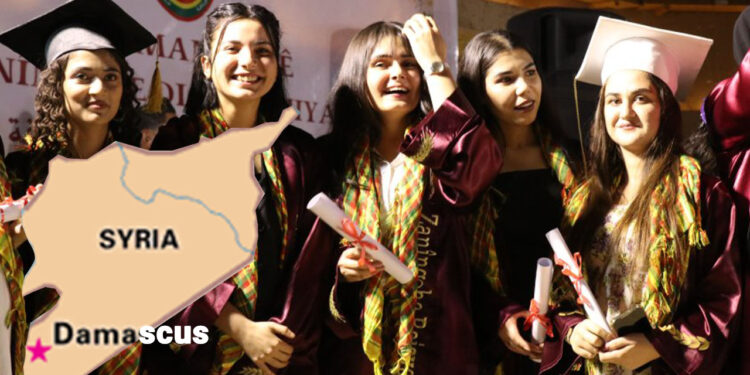As Syria navigates the aftermath of the Assad regime’s fall, international networks of academics highlight the unique, democratic, and de-colonial education model of North and East Syria’s autonomous regions as a cornerstone for a transformative and inclusive future.
With the fall of the Assad regime, Syria stands at a historic crossroads, with opportunities to build a democratic, decentralised, and pluralistic society. Against this backdrop, the Democratic Autonomous Administration of North and East Syria (AANES) has emerged as a guiding force, advocating for inclusion, gender equality, and grassroots democracy.
In a recently released statement, prominent international academic networks, including the Centre de Solidarité avec les Universités Alternatives (CSUA), Netzwerk Kurd-Akad, and the Decolonizing Knowledge and Science Network, have called for global recognition of AANES’s higher education system. This system, exemplified by universities such as Rojava University (Qamislo), Kobanê University (Kobanê), and Al-Sharq University (Raqqa), represents a radical departure from traditional academia.
A democratic educational model
These institutions embody principles of participatory and democratic governance, integrating activist scholarship with social movements. The universities’ curricula prioritise women’s liberation, sustainable ecology, and grassroots democracy, aligning theory with praxis to foster societal transformation.
“The newly established universities in North East Syria region are not only academic institutions but also active agents in the region’s broader struggle for freedom and autonomy,” the statement reads.
Challenges from Turkey and Islamist groups
Despite its innovative achievements, AANES faces significant challenges. Turkey and its proxy forces under the Syrian National Army (SNA) have continued their assaults on key areas, including Shahba (Şehba), Tel Rifaat (Til Rifat), and Manbij (Minbîc). The statement warns of Turkey’s efforts to marginalise AANES and impose jihadist, extremist and misogynistic ideologies in the new Syria.
“Turkey is the biggest obstacle to peace, democracy, and women’s rights in Syria,” the statement asserts. These organisations call on the international community to ensure AANES’s full participation in upcoming negotiations about Syria’s future.
The global call for solidarity
International networks of academics and activists have launched initiatives to counteract the isolation of AANES universities. These efforts include the establishment of working groups and an online symposium scheduled for February 2025. “The de-colonisation of knowledge must extend beyond words to practical solidarity,” the organisers note, linking the region’s educational advancements to its broader political aspirations.
The statement concludes with a powerful appeal: “The world must not allow Islamist, misogynist organisations to dominate Syria’s restructuring process. Instead, the inspiring model of AANES, with its emphasis on women’s leadership and grassroots democracy, must guide Syria’s transition.”

